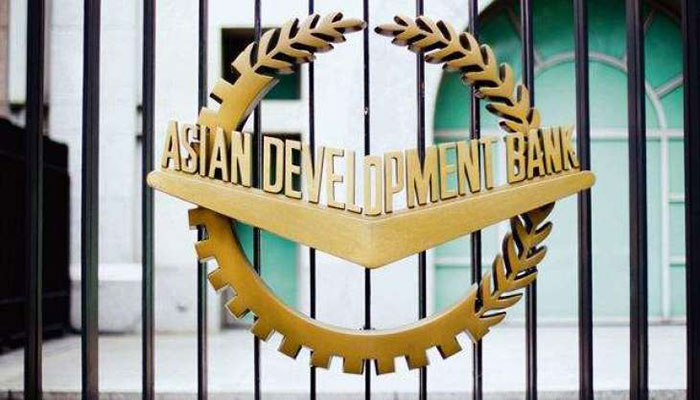ADB raises $11.4mln in first rupee-linked bonds
ISLAMABAD: Asian Development Bank (ADB) on Wednesday announced the issuance of rupee-denominated offshore bonds worth $11.4 million, while reaffirming its support to Pakistan’s development efforts.
ADB said it has raised Rs1.83 billion ($11.4 million) in a first issue of local currency Karakoram bonds by a multilateral development bank of which Pakistan is a member.
A Karakoram bond is an offshore bond denominated in Pakistan rupees and settled in US dollars, listed on a major stock exchange and settled through an international central securities depositary. The international bond issue pays a 7.50 percent semi-annual coupon and matures in August 2023. The bonds were arranged by Citigroup Global Markets and sold to European asset managers. Adviser to Prime Minister on Finance and Revenue Hafeez Shaikh said the rupee-linked Karakoram bond floated by ADB is an excellent initiative.
“I am confident it will have significant mutually beneficial outcomes for Pakistan and ADB,” Shaikh said in a statement.
State Bank of Pakistan (SBP) Governor Reza Baqir affirmed his appreciation of ADB’s support for Pakistan’s financial and economic development.
“ADB’s inaugural issue of Pakistan rupee-linked Karakoram bonds will help deepen the capital markets of Pakistan while channeling funding to vital economic sectors,” Baqir said.
The net proceeds from the sale of the bond issue will be included in ADB’s ordinary capital resources. Previously, ADB had no local currency loans in Pakistan, but this option will be offered in future projects as an alternative to dollar borrowing.
It is anticipated that ADB’s local currency loans will be a boost to private sector development in Pakistan.
“Engineering local currency solutions is both an art and a science,” said ADB Treasurer Pierre Van Peteghem. “Not only must we marry investor demand with market conditions to achieve optimal currency and interest rates, but we must also dedicate time and resources to a close dialogue with the government to achieve the best possible outcome.”
The SBP facilitated coordination with the government to y start this program. ADB is a regular borrower in the mainstream international bond markets. It has also led issuances in developing Asian countries as part of its efforts to promote local currency bond markets as an alternative to bank lending. ADB has already issued local currency bonds in Indian rupees, Kazakhstan tenge, and Mongolian togrog this year.
Meanwhile, Manila-based lender reaffirmed its support for Pakistan’s development efforts and coronavirus disease (COVID-19) pandemic response during a series of virtual meetings with senior government officials from 27 October to 17 November.
“ADB and Pakistan have a long-standing development partnership having worked together to confront various challenges and emergencies,” said Chen. “Our swift and robust response to Pakistan in combating the COVID-19 pandemic has further strengthened this partnership. We will continue to work closely with the government, development partners, and the private sector to assist Pakistan, including through our forthcoming five-year country partnership strategy. This will support the post-COVID-19 economic recovery, help to resume and strengthen reform programs, and implement the country’s development agenda.”
As part of the series of meetings, Chen also participated in a micro, small, and medium-sized enterprise-themed roundtable and engaged with the regulator, bankers, and entrepreneurs to discuss strengthening business and job opportunities for rapid post-COVID-19 recovery.
ADB has provided significant support to Pakistan’s COVID-19 response. This includes a $500 million loan approved in June to help the Government deliver social protection programs to the poor and vulnerable, expand health sector capabilities, and deliver a pro-poor fiscal stimulus to boost growth and create jobs. In May, ADB approved a $300 million emergency assistance loan to strengthen Pakistan’s public health response to the pandemic and help meet the basic needs of vulnerable and poor segments of society.
-
 South Korea: Two Killed As Military Helicopter Crashes During Training
South Korea: Two Killed As Military Helicopter Crashes During Training -
 Elon Musk Unveils SpaceX’s Moon-first Strategy With ‘self Growing Lunar City’
Elon Musk Unveils SpaceX’s Moon-first Strategy With ‘self Growing Lunar City’ -
 Donald Trump Slams Bad Bunny's Super Bowl Performance: 'Absolutely Terrible'
Donald Trump Slams Bad Bunny's Super Bowl Performance: 'Absolutely Terrible' -
 Jake Paul Criticizes Bad Bunny's Super Bowl LX Halftime Show: 'Fake American'
Jake Paul Criticizes Bad Bunny's Super Bowl LX Halftime Show: 'Fake American' -
 Prince William Wants Uncle Andrew In Front Of Police: What To Expect Of Future King
Prince William Wants Uncle Andrew In Front Of Police: What To Expect Of Future King -
 Antioxidants Found To Be Protective Agents Against Cognitive Decline
Antioxidants Found To Be Protective Agents Against Cognitive Decline -
 Hong Kong Court Sentences Media Tycoon Jimmy Lai To 20-years: Full List Of Charges Explained
Hong Kong Court Sentences Media Tycoon Jimmy Lai To 20-years: Full List Of Charges Explained -
 Coffee Reduces Cancer Risk, Research Suggests
Coffee Reduces Cancer Risk, Research Suggests -
 Katie Price Defends Marriage To Lee Andrews After Receiving Multiple Warnings
Katie Price Defends Marriage To Lee Andrews After Receiving Multiple Warnings -
 Seahawks Super Bowl Victory Parade 2026: Schedule, Route & Seattle Celebration Plans
Seahawks Super Bowl Victory Parade 2026: Schedule, Route & Seattle Celebration Plans -
 Keto Diet Emerges As Key To Alzheimer's Cure
Keto Diet Emerges As Key To Alzheimer's Cure -
 Chris Brown Reacts To Bad Bunny's Super Bowl LX Halftime Performance
Chris Brown Reacts To Bad Bunny's Super Bowl LX Halftime Performance -
 Trump Passes Verdict On Bad Bunny’s Super Bowl Halftime Show
Trump Passes Verdict On Bad Bunny’s Super Bowl Halftime Show -
 Super Bowl 2026 Live: Seahawks Defeat Patriots 29-13 To Win Super Bowl LX
Super Bowl 2026 Live: Seahawks Defeat Patriots 29-13 To Win Super Bowl LX -
 Kim Kardashian And Lewis Hamilton Make First Public Appearance As A Couple At Super Bowl 2026
Kim Kardashian And Lewis Hamilton Make First Public Appearance As A Couple At Super Bowl 2026 -
 Romeo And Cruz Beckham Subtly Roast Brooklyn With New Family Tattoos
Romeo And Cruz Beckham Subtly Roast Brooklyn With New Family Tattoos




